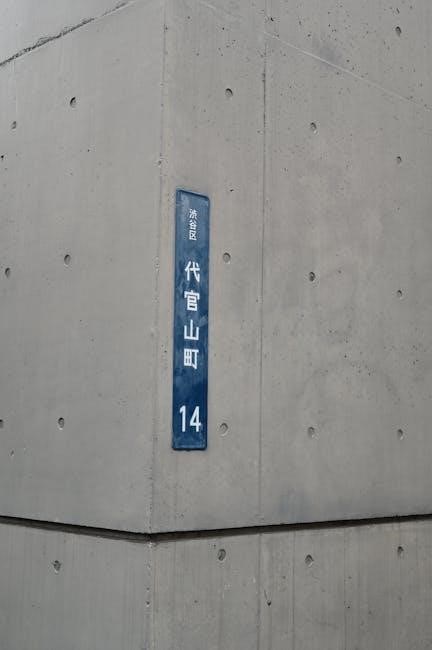Welcome to our guide on Japan’s visa application process. Understanding the requirements and procedures is crucial for a smooth experience. This section will walk you through the essential steps and tips to ensure your application is accurate and complete, helping you navigate the process efficiently.
Overview of the Importance of Visa Applications
Visa applications are a critical step for individuals seeking to enter Japan legally. They ensure compliance with immigration laws, verifying the purpose and duration of stay. Accurate documentation and adherence to requirements prevent complications, such as entry refusals or future visa denials. A properly submitted application demonstrates respect for Japan’s regulations, ensuring a smooth process for both applicants and authorities. The visa system safeguards national security while facilitating lawful travel and residence, making it essential for all prospective visitors to understand and follow the guidelines carefully.

Understanding the Types of Visas in Japan
Japan offers various visa categories tailored to different purposes, such as tourism, work, study, or family reunification. Each visa type has specific requirements, ensuring applicants choose the correct one for their visit.
Temporary Visitor Visa
The Temporary Visitor Visa is designed for individuals planning short-term stays in Japan for tourism, business, or visiting family and friends. This visa typically allows a stay of up to 90 days and does not permit work. Applicants must demonstrate that they have sufficient funds for their trip and intend to leave Japan after their visit. The process involves submitting a completed application form, a valid passport, travel itinerary, and financial proof. It’s essential to apply well in advance to ensure timely processing.
Work Visa
The Work Visa is for individuals seeking employment in Japan. It requires a job offer from a Japanese employer and approval of the Certificate of Eligibility. This certificate ensures the applicant meets specific skills, qualifications, and experience. The visa process involves submitting a completed application form, passport, employment contract, and documents proving qualifications. Applicants must demonstrate they can contribute to Japan’s economy. The employer often assists with the application. Processing times vary, so applying early is recommended to avoid delays.
Study Visa
The Study Visa allows international students to pursue education in Japan. Applicants must obtain a Certificate of Eligibility, which requires proof of admission to a Japanese educational institution. Financial stability to cover living expenses and tuition is essential. The visa application includes a completed form, passport, admission letter, and financial documents. Processing times vary, so early submission is advised. The Certificate of Eligibility simplifies the process and reduces wait times. International students must not work without proper authorization. This visa is a gateway for students to experience Japan’s renowned education system and cultural opportunities.
Eligibility Criteria for Visa Application
Applicants must meet specific requirements, including a valid passport, proof of financial stability, and a clear purpose for visiting Japan. Documentation must be accurate and complete.
General Requirements for All Visa Types
Regardless of the visa category, all applicants must submit a valid passport, a completed application form, and recent passport-sized photos. A travel itinerary or flight booking confirmation is often required to demonstrate the purpose of the visit. Additionally, proof of financial stability, such as bank statements, is necessary to ensure the applicant can support their stay in Japan. A clear travel history and valid entry documents are also typically requested. Meeting these basic criteria is essential for a successful application process.
Specific Requirements Based on Visa Category
Each visa type in Japan has unique requirements. For a work visa, a Certificate of Eligibility and employment contract are mandatory. Students must provide admission letters and financial proof from their institution. Tourists may need travel plans and hotel bookings. Investors should submit business plans and capital verification. Family visas require proof of relationship and sponsor’s residence. Understanding these category-specific demands ensures a streamlined application process and avoids delays. Gathering all necessary documents in advance is crucial for approval.

Required Documents for Visa Application
A valid passport, completed application form, travel history, and proof of financial means are essential. Each document serves a specific purpose in the application process.
Passport and Travel History
Your passport must be valid for at least six months beyond your intended stay in Japan. Ensure it has unused visa pages for entry stamps. A clear travel history, including past visas and entry/exit stamps, may be requested to assess your eligibility. Submitting a photocopy of your passport’s biodata page is often required. Additionally, providing details of previous trips can strengthen your application by demonstrating compliance with visa regulations. Accurate and complete documentation is essential to avoid delays or rejection. Ensure all information matches the details on your visa application form.
Proof of Financial Means
Applicants must demonstrate sufficient financial resources to support their stay in Japan. This typically includes submitting recent bank statements showing a minimum balance, employment certificates, or income proof. Retired individuals may provide pension statements. Students or dependents must include sponsorship documents. The required amount varies based on the visa type and duration of stay. Consular officers review these documents to ensure applicants can cover living expenses without resorting to illegal work. Providing clear and consistent financial evidence is crucial for a successful visa application. Ensure all documents are translated and notarized as required.
Invitation Letter or Sponsorship Documents
An invitation letter or sponsorship documents are required for visitors or students, confirming a host’s support in Japan. The letter must detail the host’s personal information, address, and relationship to the applicant. It should also specify the purpose and duration of the visit. For students, a sponsorship letter from a Japanese entity or individual is essential. The document must be notarized and include an official stamp if from an organization. This ensures the applicant’s stay is legitimate and financially supported, reducing the risk of visa rejection due to insufficient sponsorship evidence.

Step-by-Step Guide to Filling the Visa Application Form
Download and complete the application form accurately. Fill in all required fields, ensuring information matches your documents. Review thoroughly for errors before submission to avoid delays.
Online Application Process
The online visa application process for Japan is efficient and streamlined. Begin by accessing the official government portal or platforms like VIDEX. Create an account, fill in personal and travel details accurately, and upload required documents such as your passport and travel itinerary. Ensure all information is correct to avoid delays. Once completed, submit the form and print the confirmation receipt for tracking purposes. This method is convenient and reduces the need for in-person visits, making the process faster and more accessible for applicants. Always verify the authenticity of the platform to avoid scams.
Offline Application Process
The offline visa application process for Japan involves downloading and completing the application form from the official embassy website. Print and fill it manually, ensuring all details are accurate. Gather required documents, including passport, photos, and travel plans. Submit the completed form and documents to the nearest Japanese embassy or consulate. In-person submission may be required, and processing times can vary. This method is ideal for those preferring traditional applications or lacking reliable internet access. Ensure all information is correct to avoid rejection or delays in processing.
Common Mistakes to Avoid
When completing the visa application form for Japan, avoid common errors that could delay or reject your application. Ensure all information is accurate and matches your travel documents. Incomplete or unsigned forms are frequently rejected. Submitting incorrect or expired documents, such as an outdated passport, can also lead to issues. Additionally, failure to adhere to photo specifications or provide a clear travel itinerary may result in processing delays. Double-check all details before submission, and avoid using incorrect addresses or contact information. Properly following the embassy’s guidelines is essential for a successful application.
Submission and Processing of Visa Application
Submit your completed application to the Japanese embassy or consulate in your home country. Processing times vary, so apply well in advance of your travel date.
Where to Submit the Application
Visa applications for Japan must be submitted to the Japanese embassy, consulate, or designated regional immigration office in your home country. Ensure you check the embassy’s website for jurisdiction-specific requirements. Applications are typically submitted in person or via an authorized proxy. Some countries allow mail submissions, but this varies. Always verify the submission process and required documents beforehand to avoid delays. Following the embassy’s guidelines ensures your application is processed efficiently and correctly.
Processing Time and Fees
The processing time for a Japanese visa typically ranges from 5 to 10 business days, though it may take longer for certain types, such as work or long-term visas. Expedited processing is available for an additional fee, reducing the timeframe to 3 business days. Visa fees vary based on the type and duration of stay. A single-entry visa costs around 3,000 yen, while multiple-entry visas range from 6,000 to 12,000 yen. Payment is usually made via credit card or cash at the embassy or consulate. Always confirm the latest fee structure and processing times on the official embassy website before applying.
Tracking the Application Status
After submitting your visa application, you can track its status using the reference number provided by the Japanese embassy or consulate. Most applications offer online tracking through the embassy’s official website or a dedicated visa portal. Additionally, some applications may be monitored via email or phone by contacting the submission center. Ensure you have your reference number handy for accurate status updates. Processing times may vary, and delays can occur if additional documents are requested. Regularly checking your status helps you stay informed about the progress of your application.

Post-Approval and Entry into Japan
Once your visa is approved, ensure all documents are in order. Upon arrival, present your passport and visa to immigration officers. Comply with entry requirements and regulations.
Receiving the Visa
After processing, your visa will be affixed to your passport. Collect it from the embassy or consulate, ensuring all details are correct. Verify the visa type, entry dates, and conditions. The visa grants legal entry, but immigration officers may request additional documentation upon arrival. Understand your visa’s terms to avoid issues during your stay in Japan. Properly store your passport and visa for safe travel and entry compliance.
Entry Requirements at the Port of Entry
Upon arrival in Japan, present your valid passport, visa, and any required documents to immigration officers. Ensure your passport is valid for the duration of your stay. Depending on your visa type, additional documentation like a return ticket or proof of accommodation may be requested. Be prepared to answer questions about your travel plans and purpose of visit. Compliance with entry regulations is mandatory to avoid delays or denial of entry. Ensure all provided information matches the details in your visa application to facilitate a smooth entry process.
Extending or Changing Visa Status
To extend or change your visa status in Japan, submit an application at the local immigration office before your current visa expires. Provide proof of financial stability, accommodation, and reasons for extension. For status changes, such as switching from a work visa to a study visa, demonstrate eligibility for the new category. Employment or school enrollment may be required. Processing times vary, so apply well in advance. Ensure all documents align with the new visa requirements to avoid complications. Proper documentation and timely submission are crucial for a successful visa status adjustment.
